Concrete countertops are durable when compared to other countertop materials. They are made of cement, aggregates, and reinforcement materials, which make them strong and resistant to scratches and heat. If sealed and maintained properly, they can also resist stains and withstand everyday use. These countertops are customizable in design. However, their durability depends on regular maintenance and the possibility of repair.
It’s important to compare them with other countertop options to understand their relative durability.
Understanding Concrete Countertops
Concrete countertops are customizable and durable, making them popular for kitchens. They resist scratches and heat, which is beneficial for frequent cooking. Their design flexibility allows for unique shapes and colors, potentially increasing home value.
However, concrete is porous and can stain without proper sealing. It requires a high-quality sealer and regular upkeep, including immediate spill cleanup and yearly resealing, to maintain its condition and look.
Despite these maintenance needs, concrete countertops remain a strong and adaptable choice.
Durability Factors Explored
Concrete countertops are durable and can resist the typical wear and tear found in kitchens. Their strength allows them to last for many years with proper care. They are resistant to scratches and heat, which contributes to their longevity. Concrete can develop hairline cracks, but these are often seen as an aesthetic feature and do not affect durability. Large cracks are less common and usually result from improper installation or significant impact.
An annual sealing is recommended to protect concrete countertops from stains and water damage, which also helps to prevent large cracks. While concrete is durable, it can be damaged by abrasive cleaning tools or chemicals, which may wear away the sealant. Gentle cleaning and regular maintenance are essential to maintain the durability of concrete countertops, allowing them to remain functional for decades.
Resistance to Scratches
Concrete countertops have several advantages, including scratch resistance and durability for kitchen use. Their tough surface helps protect them from scratches, making them ideal for high-traffic areas. However, maintenance concerns such as periodic repairs and resealing are important to consider. Minor scratches can be easily fixed with sanding or epoxy fillers, and regular resealing can prevent further scratches. Despite their heat-resistance and visual appeal, concrete countertops may require more maintenance compared to other materials. Frequent sealing is necessary to maintain their scratch resistance. In summary, the scratch resistance of concrete countertops is a notable advantage, and with proper upkeep, they can remain in good condition for a long time, offering a good balance of function and style for homeowners.
Heat and Stain Considerations
Concrete countertops have some unique properties that make them a popular choice for many homeowners. One of the key advantages is their heat resistance, which means you can place hot pans directly on the surface without worrying about damage. However, it’s important to note that concrete is porous and can stain if not properly sealed and maintained.
To prevent stains, regular application of a water-based wax sealer is essential. This sealer creates a barrier against spills and helps keep the concrete looking its best. The choice of color is also important, as lighter colors may show stains more than darker ones, affecting both maintenance and appearance.
In addition to staining, acidic substances can also cause etching on the surface of concrete countertops. It’s important to clean up any spills quickly to prevent damage. If staining or damage does occur, there are options for repair. Sanding, polishing, or using epoxy fillers can often help restore the appearance of the countertop.
To ensure the longevity of your concrete countertops, it’s important to follow the manufacturer’s instructions for sealing and care. This will help keep them looking great for years to come.
Maintenance Requirements
To maintain concrete countertops, it’s important to follow a consistent maintenance routine. Proper care includes yearly sealing and immediate clean-up of spills to prevent damage and maintain appearance.
Seal concrete countertops annually with a water-based wax sealer to protect against water, stains, and daily wear. It’s essential to apply the sealer according to the manufacturer’s instructions for optimal protection.
Clean spills immediately, especially from acidic substances or those that stain, to avoid permanent marks. Use gentle, non-abrasive cleaners for regular cleaning to avoid damaging the sealer. Avoid harsh chemicals and abrasive cleaning tools as they can wear down the sealer and expose the concrete to damage.
To prevent scratches or chips, use a cutting board instead of cutting directly on the countertop. Hairline cracks may appear over time but can be repaired. Resealing the countertops regularly can help fill minor imperfections and prolong their lifespan.
Longevity and Lifespan
Concrete countertops are durable and can last for decades if properly cared for. They are strong, withstanding significant weight without damage, and are scratch and heat resistant. While they may develop minor cracks, these can often be repaired, which can extend their lifespan.
The durability of concrete countertops is not only due to the material itself but also depends on the quality of craftsmanship during fabrication and installation. High-quality work is essential for the countertops to withstand daily use.
Concrete countertops tend to be more expensive than some other materials, but their durability and potential to enhance home value can make them a worthwhile investment.
Concrete countertops offer a combination of long-term durability and design flexibility, making them a practical option for those who prioritize longevity and customization in their kitchen design.
Repair and Renovation Options
Concrete countertops may sometimes need repairs due to wear and tear. To fix hairline cracks, one can sand, polish, or use epoxy fillers. It’s important to regularly seal the countertops with a water-based wax to prevent stains and increase durability. Homeowners can often perform minor repairs themselves, but professional help is advised for more complex issues.
For renovation, concrete countertops can be refinished with stains or dyes, or embedded with objects like stones or metal for a custom look.
Comparing to Other Countertops
Concrete countertops are durable but require more maintenance than granite or quartz to prevent stains and cracks. Granite is scratch and heat resistant and doesn’t need frequent sealing. Quartz offers a non-porous surface, reducing bacteria and stain risks, and comes in various colors and patterns.
Concrete countertops can be customized in color and texture to fit any kitchen design, which stone countertops may not offer. Homeowners must consider maintenance, aesthetics, and durability when choosing a countertop material.




